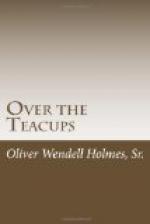“You agree with Alexander the Great,” said the Professor. “You would prefer the fame of Achilles to that of Homer, who told the story of his wrath and its direful consequences. I am afraid that I should hardly agree with you. Achilles was little better than a Choctaw brave. I won’t quote Horace’s line which characterizes him so admirably, for I will take it for granted that you all know it. He was a gentleman,—so is a first-class Indian,—a very noble gentleman in point of courage, lofty bearing, courtesy, but an unsoaped, ill-clad, turbulent, high-tempered young fellow, looked up to by his crowd very much as the champion of the heavy weights is looked up to by his gang of blackguards. Alexander himself was not much better,—a foolish, fiery young madcap. How often is he mentioned except as a warning? His best record is that he served to point a moral as ‘Macedonian’s madman.’ He made a figure, it is true, in Dryden’s great Ode, but what kind of a figure? He got drunk,—in very bad company, too,—and then turned fire-bug. He had one redeeming point,—he did value his Homer, and slept with the Iliad under his pillow. A poet like Homer seems to me worth a dozen such fellows as Achilles and Alexander.”
“Homer is all very well far those that can read him,” said Number Seven, “but the fellows that tag verses together nowadays are mostly fools. That’s my opinion. I wrote some verses once myself, but I had been sick and was very weak; hadn’t strength enough to write in prose, I suppose.”
This aggressive remark caused a little stir at our tea-table. For you must know, if I have not told you already, there are suspicions that we have more than one “poet” at our table. I have already confessed that I do myself indulge in verse now and then, and have given my readers a specimen of my work in that line. But there is so much difference of character in the verses which are produced at our table, without any signature, that I feel quite sure there are at least two or three other contributors besides myself. There is a tall, old-fashioned silver urn, a sugar-bowl of the period of the Empire, in which the poems sent to be read are placed by unseen hands. When the proper moment arrives, I lift the cover of the urn and take out any manuscript it may contain. If conversation is going on and the company are in a talking mood, I replace the manuscript or manuscripts, clap on the cover, and wait until there is a moment’s quiet before taking it off again. I might guess the writers sometimes by the handwriting, but there is more trouble taken to disguise the chirography than I choose to take to identify it as that of any particular member of our company.
The turn the conversation took, especially the slashing onslaught of Number Seven on the writers of verse, set me thinking and talking about the matter. Number Five turned on the stream of my discourse by a question.
“You receive a good many volumes of verse, do you not?” she said, with a look which implied that she knew I did.




